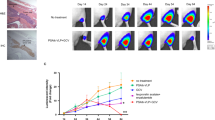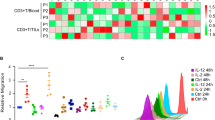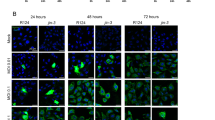Abstract
Oncolytic adenovirus-mediated suicide gene therapy has been shown to improve local tumor control in preclinical tumor models and in the clinic. Although local tumor control is important, for most human cancers, new therapies must also target metastatic disease if they are to have an impact on survival. Here, we test the hypothesis that adding cytokine gene therapy to our multimodal platform improves both local and metastatic tumor control in a preclinical model of prostate cancer. An oncolytic adenovirus (Ad5-yCD/mutTKSR39rep-mIL12) expressing two suicide genes and mouse interleukin-12 (IL-12) was generated. Relative to an adenovirus lacking IL-12 (Ad5-yCD/mutTKSR39rep), Ad5-yCD/mutTKSR39rep-mIL12 improved local and metastatic tumor control in the TRAMP-C2 prostate adenocarcinoma model, resulting in a significant increase in survival. Ad5-yCD/mutTKSR39rep-mIL12 resulted in high levels of IL-12 and interferon gamma in serum and tumor, increased natural killer (NK) and cytotoxic T-lymphocyte lytic activities, and the development of tumor-specific antitumor immunity. Immune cell depletion studies indicated that both the innate and adaptive arms of immunity were required for maximal Ad5-yCD/mutTKSR39rep-mIL12 activity. The results demonstrate that the addition of IL-12 significantly improves the efficacy of oncolytic adenovirus-mediated suicide gene therapy and provide the scientific basis for future trials targeting locally aggressive cancers.
This is a preview of subscription content, access via your institution
Access options
Subscribe to this journal
Receive 12 print issues and online access
$259.00 per year
only $21.58 per issue
Buy this article
- Purchase on Springer Link
- Instant access to full article PDF
Prices may be subject to local taxes which are calculated during checkout









Similar content being viewed by others
References
Zelefsky M, Eastman J, Sartor O, Kantoff P . Cancer of the prostate. In: DeVita V, Lawrence T, Rosenberg (eds) Cancer: Principles & Practice of Oncology. JB Lippincott: Philadelphia, PA, USA, 2008, pp 1392–1452.
Freytag S, Rogulski K, Paielli D, Gilbert J, Kim JH . A novel three-pronged approach to selectively kill cancer cells: concomitant viral, double suicide gene, and radiotherapy. Hum Gene Ther 1998; 9: 1323–1333.
Rogulski K, Zhang K, Kolozsvary A, Kim JH, Freytag S . Pronounced antitumor effects and tumor radiosensitization of double suicide gene therapy. Clin Cancer Res 1997; 3: 2081–2088.
Rogulski K, Wing M, Paielli D, Gilbert J, Kim JH, Freytag S . Double suicide gene therapy augments the therapeutic efficacy of a replication-competent lytic adenovirus through enhanced cytotoxicity and radiosensitization. Hum Gene Ther 2000; 11: 67–76.
Freytag S, Paielli D, Wing M, Rogulski K, Brown S, Kolozsvary A et al. Efficacy and toxicity of replication-competent adenovirus-mediated double suicide gene therapy in combination with radiation therapy in an orthotopic mouse prostate cancer model. Int J Radiat Oncol Biol Phys 2002; 54: 873–886.
Barton K, Paielli D, Zhang Y, Koul S, Brown S, Lu M et al. Second-generation replication-competent oncolytic adenovirus armed with improved suicide genes and the ADP gene demonstrate greater efficacy without increased toxicity. Mol Ther 2006; 13: 347–356.
Freytag S, Barton K, Zhang Y, Paielli D, Tyson D, Nall C et al. Replication-competent adenovirus-mediated suicide gene therapy with radiation in a preclinical model of pancreatic cancer. Mol Ther 2007; 15: 1600–1606.
Freytag S, Khil M, Stricker H, Peabody J, Menon M, DePeralta-Venturina M et al. Phase I study of replication-competent adenovirus-mediated double suicide gene therapy for the treatment of locally recurrent prostate cancer. Cancer Res 2002; 62: 4968–4976.
Freytag S, Stricker H, Pegg J, Paielli D, Pradhan D, Peabody J et al. Phase I study of replication-competent adenovirus-mediated double suicide gene therapy in combination with conventional dose three-dimensional conformal radiation therapy for the treatment of newly-diagnosed, intermediate- to high-risk prostate cancer. Cancer Res 2003; 63: 7497–7506.
Freytag S, Stricker H, Peabody J, Pegg J, Paielli D, Movsas B et al. Five-year follow-up of trial of replication-competent adenovirus-mediated suicide gene therapy for treatment of prostate cancer. Mol Ther 2007; 15: 636–642.
Freytag S, Movsas B, Aref I, Stricker H, Peabody J, Pegg J et al. Phase I trial of replication-competent adenovirus-mediated suicide gene therapy with IMRT for prostate cancer. Mol Ther 2007; 15: 1016–1023.
Barton K, Stricker H, Brown S, Elshaikh M, Aref I, Lu M et al. Phase I study of noninvasive imaging of adenovirus-mediated gene expression in the human prostate. Mol Ther 2008; 16: 1761–1769.
Barton K, Stricker H, Elshaikh M, Pegg J, Cheng J, Zhang Y et al. Feasibility of adenovirus-mediated hNIS gene transfer and 131I radioiodine therapy as a definitive treatment for localized prostate cancer. Mol Ther 2011; 19: 1353–1359.
Freytag S, Stricker H, Movsas B, Kim JH . Prostate cancer gene therapy clinical trials. Mol Ther 2007; 15: 1042–1052.
Freytag S, Stricker H, Movsas B, Elshaikh M, Aref I, Barton K et al. Gene therapy of prostate cancer. In: Roth JA (eds) In Gene-based Therapies for Cancer. Springer: New York, NY, USA, 2010, pp 33–49.
Trinchieri G . Interleukin-12 and the regulation of innate resistance and adaptive immunity. Nat Rev Immunol 2003; 3: 133–146.
Del Vecchio M, Bajetta E, Canova S, Lotze M, Wesa A, Parmiani G et al. Interleukin 12: biological properties and clinical application. Clin Cancer Res 2007; 13: 4677–4685.
Colombo M, Trinchieri G . Interleukin-12 in antitumor immunity and immunotherapy. Cytokine Growth Factor Rev 2002; 13: 155–168.
Tahara H, Zeh H, Storkus W, Pappo I, Watkins S, Gubler U et al. Fibroblasts genetically engineered to secrete interleukin 12 can suppress tumor growth and induce antitumor immunity to a murine melanoma in vivo. Cancer Res 1994; 54: 182–189.
Nasu Y, Bangma C, Hull G, Lee H-H, Hu J, Wang J et al. Adenovirus-mediated interleukin-12 gene therapy for prostate cancer: suppression of orthotopic tumor growth and pre-established lung metastases in an orthotopic model. Gene Therapy 1999; 6: 338–349.
Paielli D, Wing M, Rogulski K, Gilbert J, Kolozsvary A, Kim JH et al. Evaluation of the biodistribution, persistence, toxicity, and potential of germ line transmission of a replication-competent human adenovirus following intraprostatic administration in the mouse. Mol Ther 2000; 1: 263–274.
Atkins M, Robertson M, Gordon M, Lotze M, DeCoste M, DuBois J et al. Phase I evaluation of intravenous recombinant human interleukin 12 in patients with advanced malignancies. Clin Cancer Res 1997; 3: 409–417.
Leonard J, Sherman M, Fisher G, Buchanan L, Larsen G, Atkins M et al. Effects of single-dose interleukin-12 exposure on interleukin-12 associated toxicity and interferon-γ production. Blood 1997; 90: 2541–2548.
Fujita T, Timme T, Tabata K, Naruishi K, Kusaka N, Watanabe M et al. Cooperative effects of adenoviral vector-mediated interleukin 12 gene therapy with radiotherapy in a preclinical model of metastatic prostate cancer. Gene Therapy 2007; 14: 227–236.
Wang H, Yang G, Timme T, Fujita T, Naruishi K, Frolov A et al. IL-12 gene-modified bone marrow cell therapy suppresses the development of experimental metastatic prostate cancer. Cancer Gene Ther 2007; 14: 819–827.
Egilmez N, Jong Y, Sabel M, Jacob J, Mathiowitz E, Bankert R . In situ tumor vaccination with interleukin-12-encapsulated biodegradable microspheres: induction of tumor regression and potent antitumor immunity. Cancer Res 2000; 60: 3832–3837.
Hill H, Conway T, Sabel M, Jong Y, Mathiowitz E, Bankert R et al. Cancer immunotherapy with interleukin 12 and granulocyte-macrophage colony-stimulating factor-encapsulated microspheres: coinduction of innate and adaptive antitumor immunity and cure of disseminated disease. Cancer Res 2002; 62: 7254–7263.
Kilinc M, Aulakh K, Nair R, Jones S, Alard P, Kosiewicz M et al. Reversing tumor immune suppression with intratumoral IL-12: activation of tumor-associated T effector/memory cells, induction of T suppressor apoptosis, and infiltration of CD8+ T effectors. J Immunol 2006; 177: 6962–6973.
Kerkar S, Goldszmid R, Muranski P, Chinnasamy D, Yu Z, Reger R et al. IL-12 triggers a programmatic change in dysfunctional myeloid-derived cells within mouse tumors. J Clin Invest 2011; 121: 4746–4757.
Smyth M, Taniguchi M, Street S . The anti-tumor activity of IL-12: mechanisms of innate immunity that are model and dose dependent. J Immunol 2000; 165: 2665–2670.
Koski A, Kangasniemi L, Escutenaire S, Pesonen S, Cerullo V, Diaconu I et al. Treatment of cancer patients with a serotype 5/3 chimeric oncolytic adenovirus expressing GMCSF. Mol Ther 2010; 18: 1874–1884.
Cerullo V, Pesonen S, Diaconu I, Escutenaire S, Arstila P, Ugolini M et al. Oncolytic adenovirus coding for granulocyte macrophage colony-stimulating factor induces antitumoral immunity in cancer patients. Cancer Res 2010; 70: 4297–4309.
Kanerva A, Nokisalmi P, Diaconu I, Koski A, Cerullo V, Liikanen I et al. Antiviral and antitumor T-cell immunity in patients treated with GM-CSF-coding oncolytic adenovirus. Clin Cancer Res 2013; 19: 2734–2744.
Heo J, Reid T, Ruo L, Breitbach C, Rose S, Bloomston M et al. Randomized dose-finding clinical trial of oncolytic immunotherapeutic vaccinia JX-594 in liver cancer. Nat Med 2013; 19: 329–336.
Kaufman H, Kim D, DeRaffele G, Mitcham J, Coffin R, Kim-Schulze S . Local and distant immunity induced by intralesional vaccination with an oncolytic herpes virus encoding GM-CSF in patients with stage IIIc and IV melanoma. Ann Surg Oncol 2010; 17: 718–730.
Acknowledgements
We thank Dr Wei-Zen Wei for protocols and help with the immunological assays. This work was supported by National Institutes of Health (NIH) grant CA160289 to SOF.
Author information
Authors and Affiliations
Corresponding author
Ethics declarations
Competing interests
The authors declare no conflict of interest.
Rights and permissions
About this article
Cite this article
Freytag, S., Barton, K. & Zhang, Y. Efficacy of oncolytic adenovirus expressing suicide genes and interleukin-12 in preclinical model of prostate cancer. Gene Ther 20, 1131–1139 (2013). https://doi.org/10.1038/gt.2013.40
Received:
Revised:
Accepted:
Published:
Issue Date:
DOI: https://doi.org/10.1038/gt.2013.40
Keywords
This article is cited by
-
Oncolytic virus-based suicide gene therapy for cancer treatment: a perspective of the clinical trials conducted at Henry Ford Health
Translational Medicine Communications (2023)
-
Nanoparticle-mediated tumor cell expression of mIL-12 via systemic gene delivery treats syngeneic models of murine lung cancers
Scientific Reports (2021)
-
Intratumoral expression using a NFkB-based promoter enhances IL12 antitumor efficacy
Cancer Gene Therapy (2019)
-
Potentiating prostate cancer immunotherapy with oncolytic viruses
Nature Reviews Urology (2018)
-
Efficacy of combining ING4 and TRAIL genes in cancer-targeting gene virotherapy strategy: first evidence in preclinical hepatocellular carcinoma
Gene Therapy (2018)



